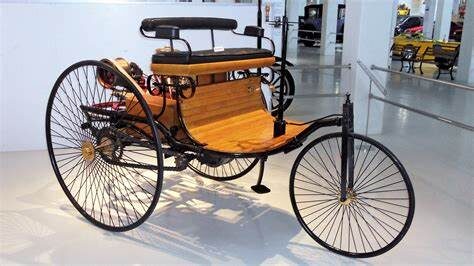
Introduction
Imagine a world where the streets are silent, the air is still, and the only mode of transport is a horse-drawn carriage. Now, picture a revolutionary invention that would change the course of history and transform the way we travel forever. Enter Carl Benz, a brilliant engineer whose relentless passion and innovative spirit ignited the dawn of the automobile age.
Carl Benz, born on November 25, 1844, in Mühlburg, Germany, is recognized as the “father of the automobile” and a pivotal figure in the automotive industry. His most significant achievement, the Benz Patent Motorcar, was patented in 1886 and is considered the first practical automobile powered by an internal combustion engine.
Early Life and Education
Benz was born to a locomotive driver and faced financial hardships after his father’s early death. Despite these challenges, his mother ensured he received a good education. He excelled in his studies and graduated from the Polytechnic School in Karlsruhe in 1864, specializing in mechanical engineering.
Career Beginnings
Benz’s career began with various engineering jobs, but he struggled to find a stable position. In 1883, he co-founded Benz & Cie. with financial partners, focusing on manufacturing stationary engines. His vision of a “horseless carriage” led him to develop the first automobile, culminating in the creation of the Benz Patent Motorcar.
The Benz Patent Motorcar
The Benz Patent Motorcar was a groundbreaking vehicle that utilized a two-stroke engine. It was initially met with skepticism, but the turning point came when his wife, Bertha Benz, undertook a historic long-distance drive in 1888, demonstrating the car’s practicality and reliability. This journey significantly boosted public interest and acceptance of the automobile.

Legacy and Later Life
Benz & Cie. grew to become the world’s largest automobile manufacturer by the early 1900s. In 1926, the company merged with Daimler-Motoren-Gesellschaft to form Daimler-Benz, which produced the renowned Mercedes-Benz brand. Carl Benz continued to innovate, even establishing a new company, C. Benz Söhne, with his sons in 1906.Benz passed away on April 4, 1929, in Ladenburg, Germany. His contributions to engineering and the automotive industry have left an indelible mark, making him a celebrated figure in automotive history.

Modern Day Mercedes Benz Automobiles
Mercedes-Benz continues to be a leader in the luxury automobile market, offering a diverse range of modern vehicles that combine cutting-edge technology, performance, and opulence. Here are some key highlights of their current lineup:
Current Models
- Sedans: Mercedes-Benz offers a variety of sedans, including the popular C-Class and E-Class, which are known for their luxurious interiors and advanced technology features.
- SUVs: The SUV range includes models like the GLC and GLE, which provide spacious interiors and versatile performance options, including gasoline, diesel, and hybrid variants.
- Coupes and Convertibles: The brand also features stylish coupes and convertibles, such as the C-Class Coupe and the E-Class Cabriolet, which emphasize sportiness and elegance.
- Electric Vehicles: With a growing focus on sustainability, Mercedes-Benz has introduced electric models under the EQ brand, including the EQS, an all-electric luxury sedan, and the EQB SUV, showcasing their commitment to electric mobility.
- Performance Models: The AMG line offers high-performance variants of many models, delivering enhanced power and sport-tuned handling for enthusiasts.
Innovations and Technology
Mercedes-Benz is at the forefront of automotive technology, integrating features such as:
- MBUX Infotainment System: This advanced system includes voice control, augmented reality navigation, and a customizable interface for a seamless user experience.
- Safety Features: The brand’s vehicles are equipped with state-of-the-art safety technologies, including active brake assist, lane-keeping assist, and adaptive cruise control, ensuring a secure driving experience.
- Hybrid and Plug-in Hybrid Options: Many models now offer hybrid variants, combining traditional engines with electric power for improved efficiency without sacrificing performance.
Conclusion
In summary, modern-day Mercedes-Benz automobiles represent a blend of luxury, performance, and innovation, catering to a wide range of consumer preferences while maintaining the brand’s prestigious reputation. Whether through their traditional sedans, versatile SUVs, or cutting-edge electric vehicles, Mercedes-Benz continues to set the standard in the automotive industry.
FAQs
Here are some frequently asked questions about Carl Benz and his contributions to the automobile industry:
What did Carl Benz invent?
Carl Benz is credited with inventing the first practical automobile powered by an internal combustion engine. In 1886, he patented the Benz Patent Motorcar, a three-wheeled vehicle that is considered the birth certificate of the modern automobile.
When was the first automobile invented by Carl Benz?
The Benz Patent Motorcar, considered the first modern automobile, was patented by Carl Benz in 1886. The vehicle first ran in 1885, but the design was not patented until January 29, 1886.
What company did Carl Benz found?
In 1883, Carl Benz founded Benz & Co. Rheinische Gasmotoren-Fabrik in Mannheim, which became the world’s largest automobile manufacturer by the early 1900s. In 1926, Benz & Co. merged with Daimler-Motoren-Gesellschaft to form Daimler-Benz, which produces the Mercedes-Benz brand.
Who was Carl Benz’s wife?
Carl Benz’s wife was Bertha Benz, a carpenter’s daughter from Pforzheim. They married on July 20, 1872. Bertha Benz was instrumental in the success of Carl Benz’s inventions, providing financial and emotional support. In 1888, she undertook a historic long-distance drive in one of her husband’s vehicles, demonstrating its practicality and reliability.
When did Carl Benz die?
Carl Benz passed away on April 4, 1929, in Ladenburg, Germany at the age of 84. He lived to see the breakthrough of his idea and the rise of motorized transportation.
Read More Post
Latest Trend in Car Technology: Hybrid Electric Vehicles (HEVs)


